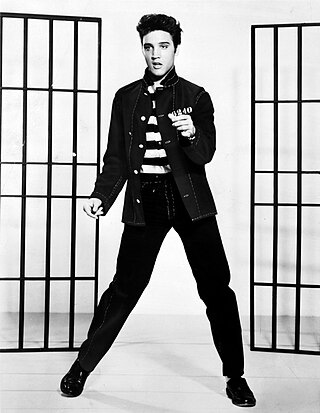
Elvis Aaron Presley, known mononymously as Elvis, was an American singer and actor. Known as the "King of Rock and Roll", he is regarded as one of the most significant cultural figures of the 20th century. Presley's energized performances and interpretations of songs, and sexually provocative dance moves, combined with a singularly potent mix of influences across color lines during a transformative era in race relations, brought both great success and initial controversy.
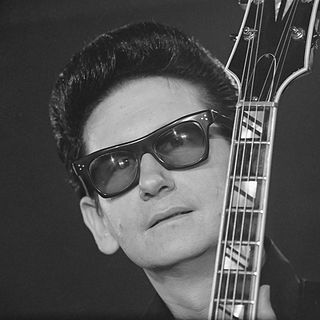
Roy Kelton Orbison was an American singer, songwriter, and guitarist known for his distinctive and powerful voice, complex song structures, and dark, emotional ballads. Orbison's music is mostly in the rock music genre and his most successful periods were in the early 1960s and the late 1980s. He was nicknamed "The Caruso of Rock" and "The Big O". Many of Orbison's songs conveyed vulnerability at a time when most male rock-and-roll performers projected machismo. He performed with minimal motion and in black clothes, matching his dyed black hair and dark sunglasses.
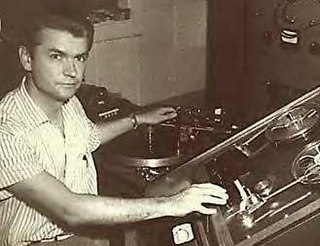
Samuel Cornelius Phillips was an American disc jockey, songwriter and record producer. He was the founder of Sun Records and Sun Studio in Memphis, Tennessee, where he produced recordings by Elvis Presley, Roy Orbison, Jerry Lee Lewis, Carl Perkins, Johnny Cash, and Howlin' Wolf. Phillips played a major role in the development of rock and roll during the 1950s, launching the career of Presley. In 1969, he sold Sun to Shelby Singleton.

Sun Records is an American independent record label founded by producer Sam Phillips in Memphis, Tennessee on February 1, 1952. Sun was the first label to record Elvis Presley, Charlie Rich, Roy Orbison, Jerry Lee Lewis, Carl Perkins, and Johnny Cash. Prior to that, Sun had concentrated mainly on African-American musicians because Phillips loved rhythm and blues and wanted to bring it to a white audience.

"Heartbreak Hotel" is a song recorded by American singer Elvis Presley. It was released as a single on January 27, 1956, Presley's first on his new record label RCA Victor. It was written by Mae Boren Axton and Tommy Durden, with credit being given also to Presley. A newspaper article about the suicide of a lonely man who jumped from a hotel window inspired the song. Axton presented the song to Presley in November 1955 at a country music convention in Nashville. Presley recorded it on January 10, 1956, in a session with his band, the Blue Moon Boys, the guitarist Chet Atkins and the pianist Floyd Cramer. "Heartbreak Hotel" comprises an eight-bar blues progression, with heavy reverberation throughout the track, to imitate the character of Presley's Sun recordings.

Winfield Scott Moore III was an American guitarist who formed The Blue Moon Boys in 1954, Elvis Presley's backing band. He was studio and touring guitarist for Presley between 1954 and 1968.
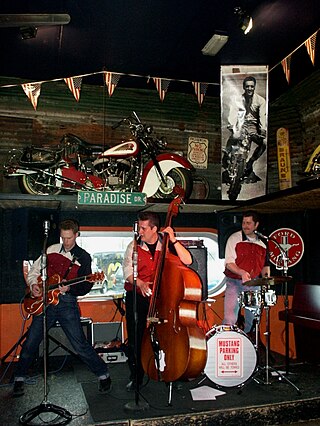
Rockabilly is one of the earliest styles of rock and roll music. It dates back to the early 1950s in the United States, especially the South. As a genre, it blends the sound of Western musical styles such as country with that of rhythm and blues, leading to what is considered "classic" rock and roll. Some have also described it as a blend of bluegrass with rock and roll. The term "rockabilly" itself is a portmanteau of "rock" and "hillbilly", the latter a reference to the country music that contributed strongly to the style. Other important influences on rockabilly include western swing, boogie-woogie, jump blues, and electric blues.

"Hound Dog" is a twelve-bar blues song written by Jerry Leiber and Mike Stoller. Recorded originally by Big Mama Thornton on August 13, 1952, in Los Angeles and released by Peacock Records in late February 1953, "Hound Dog" was Thornton's only hit record, selling over 500,000 copies, spending 14 weeks in the R&B charts, including seven weeks at number one. Thornton's recording of "Hound Dog" is listed as one of the Rock and Roll Hall of Fame's "500 Songs That Shaped Rock and Roll", ranked at 318 in the 2021 iteration of Rolling Stone's 500 Greatest Songs of All Time and was inducted into the Grammy Hall of Fame in February 2013.

William Patton Black Jr. was an American musician and bandleader who is noted as one of the pioneers of rock and roll. He played in Elvis Presley's early trio, The Blue Moon Boys. Black later formed Bill Black's Combo.

Sun Studio is a recording studio opened by rock-and-roll pioneer Sam Phillips at 706 Union Avenue in Memphis, Tennessee, on January 3, 1950. It was originally called Memphis Recording Service, sharing the same building with the Sun Records label business. The Sun label that was housed within the studio played a large role in Elvis Presley's early career.

"Million Dollar Quartet" is a recording of an impromptu jam session involving Elvis Presley, Jerry Lee Lewis, Carl Perkins, and Johnny Cash made on December 4, 1956, at the Sun Record Studios in Memphis, Tennessee. An article about the session was published in the Memphis Press-Scimitar under the title "Million Dollar Quartet". The recording was first released in Europe in 1981 as The Million Dollar Quartet with 17 tracks. A few years later more tracks were discovered and released as The Complete Million Dollar Session. In 1990, the recordings were released in the United States as Elvis Presley: The Million Dollar Quartet. This session is considered a seminal moment in rock and roll.
Gail Brewer-Giorgio is an American author whose works have speculated about the possibility that singer Elvis Presley may have faked his death in August 1977.

Elvis is the second studio album by American rock and roll singer Elvis Presley, released by RCA Victor on October 19, 1956 in mono. Recording sessions took place on September 1, September 2, and September 3 at Radio Recorders in Hollywood, with one track left over from the sessions for Presley's debut album at the RCA Victor recording studios on January 30 in New York. It spent four weeks at #1 on the Billboard Top Pop Albums chart that year, making Presley the first recording artist to have both albums go straight to number one in the same year. It would go on to spend 5 weeks at #1 in total. It was certified Gold on February 17, 1960, and Platinum on August 10, 2011, by the Recording Industry Association of America.

Elvis Is Back! is the fourth studio album by American singer Elvis Presley, released on April 8, 1960 by RCA Victor. It was Presley's first album of new material since 1958's King Creole soundtrack, as well as his first to be recorded and released in stereophonic sound. The album marked Presley's return to music after his discharge from the U.S. Army.

How Great Thou Art is the eighth studio album by American singer and musician Elvis Presley, released by RCA Victor in February 1967. How Great Thou Art is a gospel album with slow numbers on one side, and fast-paced numbers on the flipside. The album earned Presley a Grammy Award for Best Sacred Performance, while it became a Billboard top 20 pop hit and it appeared on the Top Country Albums chart on the top 10.

Elvis for Everyone! is a compilation album by American singer and musician Elvis Presley, issued by RCA Victor in mono and stereo, LPM/LSP 3450, on August 10, 1965. Recording sessions took place over a ten-year span at Sun Studio in Memphis, RCA Studio B in Nashville, Tennessee, and Radio Recorders in Hollywood, California. It peaked at number 10 on the Top Pop Albums chart.
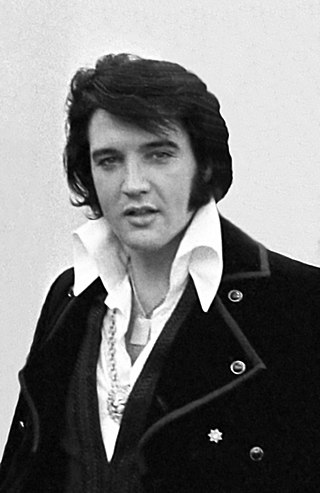
Sightings of the American singer Elvis Presley have been reported following his death in 1977. The conspiracy theory that Elvis did not die and instead went into hiding was popularized by Gail Brewer-Giorgio and other authors.

Elvis' Greatest Shit is a bootleg recording of Elvis Presley, released in July 1982. It assembles a number of studio recordings, live recordings, and outtakes intended to represent the worst recordings that Presley made in his career.
"I'm Left, You're Right, She's Gone" is a song written by Bill Taylor and Stan Kesler, and originally recorded by Elvis Presley for Sun Records.

















